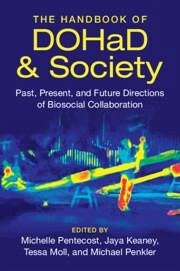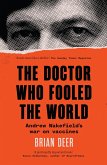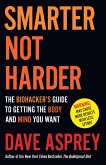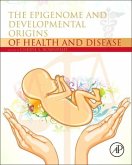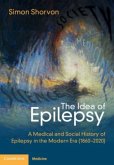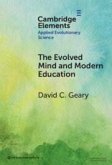The Handbook of DOHaD and Society
Past, Present, and Future Directions of Biosocial Collaboration
Herausgeber: Keaney, Jaya; Moll, Tessa; Pentecost, Michelle; Penkler, Michael
The Handbook of DOHaD and Society
Past, Present, and Future Directions of Biosocial Collaboration
Herausgeber: Keaney, Jaya; Moll, Tessa; Pentecost, Michelle; Penkler, Michael
- Gebundenes Buch
- Merkliste
- Auf die Merkliste
- Bewerten Bewerten
- Teilen
- Produkt teilen
- Produkterinnerung
- Produkterinnerung
An accessible introductory text for students in DOHaD, epidemiology, medical anthropology and global public health, providing an overview of the field, key concepts, and cutting-edge examples of interdisciplinary collaboration in a growing area of postgenomics research. This title is also available as Open Access on Cambridge Core.
Andere Kunden interessierten sich auch für
![The Doctor Who Fooled the World The Doctor Who Fooled the World]() Brian DeerThe Doctor Who Fooled the World15,99 €
Brian DeerThe Doctor Who Fooled the World15,99 €![Smarter Not Harder Smarter Not Harder]() Dave AspreySmarter Not Harder24,99 €
Dave AspreySmarter Not Harder24,99 €![The Epigenome and Developmental Origins of Health and Disease The Epigenome and Developmental Origins of Health and Disease]() Cheryl RosenfeldThe Epigenome and Developmental Origins of Health and Disease132,99 €
Cheryl RosenfeldThe Epigenome and Developmental Origins of Health and Disease132,99 €![The Goodness Paradox The Goodness Paradox]() Richard WranghamThe Goodness Paradox20,99 €
Richard WranghamThe Goodness Paradox20,99 €![Nightmare Scenario Nightmare Scenario]() Yasmeen AbutalebNightmare Scenario27,99 €
Yasmeen AbutalebNightmare Scenario27,99 €![The Idea of Epilepsy The Idea of Epilepsy]() Simon D. Shorvon (University College London Institute of NeurologyThe Idea of Epilepsy92,99 €
Simon D. Shorvon (University College London Institute of NeurologyThe Idea of Epilepsy92,99 €![The Evolved Mind and Modern Education The Evolved Mind and Modern Education]() David C. Geary (University of Missouri)The Evolved Mind and Modern Education75,99 €
David C. Geary (University of Missouri)The Evolved Mind and Modern Education75,99 €-
-
-
An accessible introductory text for students in DOHaD, epidemiology, medical anthropology and global public health, providing an overview of the field, key concepts, and cutting-edge examples of interdisciplinary collaboration in a growing area of postgenomics research. This title is also available as Open Access on Cambridge Core.
Hinweis: Dieser Artikel kann nur an eine deutsche Lieferadresse ausgeliefert werden.
Hinweis: Dieser Artikel kann nur an eine deutsche Lieferadresse ausgeliefert werden.
Produktdetails
- Produktdetails
- Verlag: Cambridge University Press
- Seitenzahl: 366
- Erscheinungstermin: 27. Juni 2024
- Englisch
- Abmessung: 241mm x 164mm x 27mm
- Gewicht: 714g
- ISBN-13: 9781009201728
- ISBN-10: 1009201727
- Artikelnr.: 70148339
- Herstellerkennzeichnung
- Libri GmbH
- Europaallee 1
- 36244 Bad Hersfeld
- gpsr@libri.de
- Verlag: Cambridge University Press
- Seitenzahl: 366
- Erscheinungstermin: 27. Juni 2024
- Englisch
- Abmessung: 241mm x 164mm x 27mm
- Gewicht: 714g
- ISBN-13: 9781009201728
- ISBN-10: 1009201727
- Artikelnr.: 70148339
- Herstellerkennzeichnung
- Libri GmbH
- Europaallee 1
- 36244 Bad Hersfeld
- gpsr@libri.de
Introduction: Michael Penkler, Tessa Moll, Jaya Keaney and Michelle
Pentecost; Part I. Mapping the Field's Past: 1. Porous bodies, impressible
mothers: a global and longue durée perspective Maurizio Meloni and Natasha
Rooney; 2. Transformations of the maternal-fetal relationship in the
twentieth century: from maternal impressions to epigenetic states Tatjana
Buklijas; 3. The first 5000 days: making DOHaD, 1989-2003 Mark Hanson and
Tatjana Buklijas; Part II. The Social Life of DOHaD: 4. A biosocial return
to race? Racial differences in DOHaD and environmental epigenetics Maurizio
Meloni, Christopher Kuzawa, Ayuba Issaka and Tessa Moll; 5. The promise and
treachery of nutrition in DOHaD: science, biopolitics, and gender Vivienne
Moore and Megan Warin; 6. Gender, racism and DOHaD Natali Valdez and
Martine Lappé; 7. DOHaD in economics: orthodox and egalitarian approaches
Jennifer Cohen; 8. The 'moral paradox' of DOHaD Luca Chiapperino, Cindy
Gerber, Francesco Panese and Umberto Simeoni; 9. Intergenerational justice,
law and DOHaD Isabel Karpin; Part III. Key Concepts for Biosocial Research:
10. Lifecourse Mark Tomlinson, Amelia van der Merwe, Marguerite Marlow and
Sarah Skeen; 11. Syndemics Edna Bosire, Michelle Pentecost and Emily
Mendenhall; 12. Embodiment Ziyanda Majombozi and Mutsawashe Mutendi; 13.
Causal crypticity Sarah S. Richardson; 14. Intergenerational trauma Jaya
Keaney, Henrietta Byrne, Megan Warin and Emma Kowal; 15. Bioethnography
Elizabeth F. S. Roberts, Jaclyn M. Goodrich, Erica C. Jansen, Belinda L.
Needham, Brisa N. Sánchez and Martha M. Téllez Rojo; Part IV. Translations
in Policy and Practice: 16. Translating evidence to policy: the challenge
for DOHaD advocacy Felicia Low, Peter Gluckman and Mark Hanson; 17. Framing
DOHaD for policy and society Chandni Maria Jacob, Michael Penkler, Ruth
Muller and Mark Hanson; 18. The impact of community based participatory
DOHaD research Siobhan Tu'akoi, Mark H. Vickers, Celeste Barrett-Watson,
Kura Samuel-Ioane, Teaukura Puna, Joseph Drollet and Jacqui L. Bay; 19. The
first 1000 Days and clinical practice in infant mental health Anusha
Lachman, Astrid Berg, Fiona C. Ross and Simone M. Peters; Part V. The
Biosocial in Practice: 20. Understanding child development: a biosocial
anthropological approach to early life Emily H. Emmott and Sahra Gibbon;
21. Building biosocial collaboration in the HeLTI-South Africa trial
Michelle Pentecost, Catherine E Draper, Khuthala Mabetha, Larske M Soepnel
and Shane A Norris; 22. Doing environments in DOHaD and epigenetics Sophia
Rossmann and Georgia Samaras; 23. Narrative choreographies: DOHaD, social
justice and health equity Martha Kenney and Ruth Müller; 24.
Interdependence: reworking ontogeny through fishbones and dirty chickens
Shivani Kaul and Emily Yates-Doerr; Part VI. Future Directions: 25.
Modelling in DOHaD: challenges and opportunities in the era of big data
Julie Sigurdardottir and Salma Ayis; 26. The promise of reversibility in
neuroepigenetics research on traumatic memories Stephanie Lloyd,
Pierre-Eric Lutz and Chani Bonventre; 27. Disability in DOHaD and
epigenetics: towards inclusive practice Katie Saulnier, Lara Azevedo, Neera
Bhatia, Lillian Dipnall, Evie Kendal, Garth Stephenson and Jeffrey M Craig;
28. Creating good data our way: an Indigenous lens for epidemiology and
intergenerational health Sarah Bourke and Raymond Lovett; 29. DOHaD in the
Anthropocene: taking responsibility for anthropogenic biologies Jörg
Niewöhner.
Pentecost; Part I. Mapping the Field's Past: 1. Porous bodies, impressible
mothers: a global and longue durée perspective Maurizio Meloni and Natasha
Rooney; 2. Transformations of the maternal-fetal relationship in the
twentieth century: from maternal impressions to epigenetic states Tatjana
Buklijas; 3. The first 5000 days: making DOHaD, 1989-2003 Mark Hanson and
Tatjana Buklijas; Part II. The Social Life of DOHaD: 4. A biosocial return
to race? Racial differences in DOHaD and environmental epigenetics Maurizio
Meloni, Christopher Kuzawa, Ayuba Issaka and Tessa Moll; 5. The promise and
treachery of nutrition in DOHaD: science, biopolitics, and gender Vivienne
Moore and Megan Warin; 6. Gender, racism and DOHaD Natali Valdez and
Martine Lappé; 7. DOHaD in economics: orthodox and egalitarian approaches
Jennifer Cohen; 8. The 'moral paradox' of DOHaD Luca Chiapperino, Cindy
Gerber, Francesco Panese and Umberto Simeoni; 9. Intergenerational justice,
law and DOHaD Isabel Karpin; Part III. Key Concepts for Biosocial Research:
10. Lifecourse Mark Tomlinson, Amelia van der Merwe, Marguerite Marlow and
Sarah Skeen; 11. Syndemics Edna Bosire, Michelle Pentecost and Emily
Mendenhall; 12. Embodiment Ziyanda Majombozi and Mutsawashe Mutendi; 13.
Causal crypticity Sarah S. Richardson; 14. Intergenerational trauma Jaya
Keaney, Henrietta Byrne, Megan Warin and Emma Kowal; 15. Bioethnography
Elizabeth F. S. Roberts, Jaclyn M. Goodrich, Erica C. Jansen, Belinda L.
Needham, Brisa N. Sánchez and Martha M. Téllez Rojo; Part IV. Translations
in Policy and Practice: 16. Translating evidence to policy: the challenge
for DOHaD advocacy Felicia Low, Peter Gluckman and Mark Hanson; 17. Framing
DOHaD for policy and society Chandni Maria Jacob, Michael Penkler, Ruth
Muller and Mark Hanson; 18. The impact of community based participatory
DOHaD research Siobhan Tu'akoi, Mark H. Vickers, Celeste Barrett-Watson,
Kura Samuel-Ioane, Teaukura Puna, Joseph Drollet and Jacqui L. Bay; 19. The
first 1000 Days and clinical practice in infant mental health Anusha
Lachman, Astrid Berg, Fiona C. Ross and Simone M. Peters; Part V. The
Biosocial in Practice: 20. Understanding child development: a biosocial
anthropological approach to early life Emily H. Emmott and Sahra Gibbon;
21. Building biosocial collaboration in the HeLTI-South Africa trial
Michelle Pentecost, Catherine E Draper, Khuthala Mabetha, Larske M Soepnel
and Shane A Norris; 22. Doing environments in DOHaD and epigenetics Sophia
Rossmann and Georgia Samaras; 23. Narrative choreographies: DOHaD, social
justice and health equity Martha Kenney and Ruth Müller; 24.
Interdependence: reworking ontogeny through fishbones and dirty chickens
Shivani Kaul and Emily Yates-Doerr; Part VI. Future Directions: 25.
Modelling in DOHaD: challenges and opportunities in the era of big data
Julie Sigurdardottir and Salma Ayis; 26. The promise of reversibility in
neuroepigenetics research on traumatic memories Stephanie Lloyd,
Pierre-Eric Lutz and Chani Bonventre; 27. Disability in DOHaD and
epigenetics: towards inclusive practice Katie Saulnier, Lara Azevedo, Neera
Bhatia, Lillian Dipnall, Evie Kendal, Garth Stephenson and Jeffrey M Craig;
28. Creating good data our way: an Indigenous lens for epidemiology and
intergenerational health Sarah Bourke and Raymond Lovett; 29. DOHaD in the
Anthropocene: taking responsibility for anthropogenic biologies Jörg
Niewöhner.
Introduction: Michael Penkler, Tessa Moll, Jaya Keaney and Michelle
Pentecost; Part I. Mapping the Field's Past: 1. Porous bodies, impressible
mothers: a global and longue durée perspective Maurizio Meloni and Natasha
Rooney; 2. Transformations of the maternal-fetal relationship in the
twentieth century: from maternal impressions to epigenetic states Tatjana
Buklijas; 3. The first 5000 days: making DOHaD, 1989-2003 Mark Hanson and
Tatjana Buklijas; Part II. The Social Life of DOHaD: 4. A biosocial return
to race? Racial differences in DOHaD and environmental epigenetics Maurizio
Meloni, Christopher Kuzawa, Ayuba Issaka and Tessa Moll; 5. The promise and
treachery of nutrition in DOHaD: science, biopolitics, and gender Vivienne
Moore and Megan Warin; 6. Gender, racism and DOHaD Natali Valdez and
Martine Lappé; 7. DOHaD in economics: orthodox and egalitarian approaches
Jennifer Cohen; 8. The 'moral paradox' of DOHaD Luca Chiapperino, Cindy
Gerber, Francesco Panese and Umberto Simeoni; 9. Intergenerational justice,
law and DOHaD Isabel Karpin; Part III. Key Concepts for Biosocial Research:
10. Lifecourse Mark Tomlinson, Amelia van der Merwe, Marguerite Marlow and
Sarah Skeen; 11. Syndemics Edna Bosire, Michelle Pentecost and Emily
Mendenhall; 12. Embodiment Ziyanda Majombozi and Mutsawashe Mutendi; 13.
Causal crypticity Sarah S. Richardson; 14. Intergenerational trauma Jaya
Keaney, Henrietta Byrne, Megan Warin and Emma Kowal; 15. Bioethnography
Elizabeth F. S. Roberts, Jaclyn M. Goodrich, Erica C. Jansen, Belinda L.
Needham, Brisa N. Sánchez and Martha M. Téllez Rojo; Part IV. Translations
in Policy and Practice: 16. Translating evidence to policy: the challenge
for DOHaD advocacy Felicia Low, Peter Gluckman and Mark Hanson; 17. Framing
DOHaD for policy and society Chandni Maria Jacob, Michael Penkler, Ruth
Muller and Mark Hanson; 18. The impact of community based participatory
DOHaD research Siobhan Tu'akoi, Mark H. Vickers, Celeste Barrett-Watson,
Kura Samuel-Ioane, Teaukura Puna, Joseph Drollet and Jacqui L. Bay; 19. The
first 1000 Days and clinical practice in infant mental health Anusha
Lachman, Astrid Berg, Fiona C. Ross and Simone M. Peters; Part V. The
Biosocial in Practice: 20. Understanding child development: a biosocial
anthropological approach to early life Emily H. Emmott and Sahra Gibbon;
21. Building biosocial collaboration in the HeLTI-South Africa trial
Michelle Pentecost, Catherine E Draper, Khuthala Mabetha, Larske M Soepnel
and Shane A Norris; 22. Doing environments in DOHaD and epigenetics Sophia
Rossmann and Georgia Samaras; 23. Narrative choreographies: DOHaD, social
justice and health equity Martha Kenney and Ruth Müller; 24.
Interdependence: reworking ontogeny through fishbones and dirty chickens
Shivani Kaul and Emily Yates-Doerr; Part VI. Future Directions: 25.
Modelling in DOHaD: challenges and opportunities in the era of big data
Julie Sigurdardottir and Salma Ayis; 26. The promise of reversibility in
neuroepigenetics research on traumatic memories Stephanie Lloyd,
Pierre-Eric Lutz and Chani Bonventre; 27. Disability in DOHaD and
epigenetics: towards inclusive practice Katie Saulnier, Lara Azevedo, Neera
Bhatia, Lillian Dipnall, Evie Kendal, Garth Stephenson and Jeffrey M Craig;
28. Creating good data our way: an Indigenous lens for epidemiology and
intergenerational health Sarah Bourke and Raymond Lovett; 29. DOHaD in the
Anthropocene: taking responsibility for anthropogenic biologies Jörg
Niewöhner.
Pentecost; Part I. Mapping the Field's Past: 1. Porous bodies, impressible
mothers: a global and longue durée perspective Maurizio Meloni and Natasha
Rooney; 2. Transformations of the maternal-fetal relationship in the
twentieth century: from maternal impressions to epigenetic states Tatjana
Buklijas; 3. The first 5000 days: making DOHaD, 1989-2003 Mark Hanson and
Tatjana Buklijas; Part II. The Social Life of DOHaD: 4. A biosocial return
to race? Racial differences in DOHaD and environmental epigenetics Maurizio
Meloni, Christopher Kuzawa, Ayuba Issaka and Tessa Moll; 5. The promise and
treachery of nutrition in DOHaD: science, biopolitics, and gender Vivienne
Moore and Megan Warin; 6. Gender, racism and DOHaD Natali Valdez and
Martine Lappé; 7. DOHaD in economics: orthodox and egalitarian approaches
Jennifer Cohen; 8. The 'moral paradox' of DOHaD Luca Chiapperino, Cindy
Gerber, Francesco Panese and Umberto Simeoni; 9. Intergenerational justice,
law and DOHaD Isabel Karpin; Part III. Key Concepts for Biosocial Research:
10. Lifecourse Mark Tomlinson, Amelia van der Merwe, Marguerite Marlow and
Sarah Skeen; 11. Syndemics Edna Bosire, Michelle Pentecost and Emily
Mendenhall; 12. Embodiment Ziyanda Majombozi and Mutsawashe Mutendi; 13.
Causal crypticity Sarah S. Richardson; 14. Intergenerational trauma Jaya
Keaney, Henrietta Byrne, Megan Warin and Emma Kowal; 15. Bioethnography
Elizabeth F. S. Roberts, Jaclyn M. Goodrich, Erica C. Jansen, Belinda L.
Needham, Brisa N. Sánchez and Martha M. Téllez Rojo; Part IV. Translations
in Policy and Practice: 16. Translating evidence to policy: the challenge
for DOHaD advocacy Felicia Low, Peter Gluckman and Mark Hanson; 17. Framing
DOHaD for policy and society Chandni Maria Jacob, Michael Penkler, Ruth
Muller and Mark Hanson; 18. The impact of community based participatory
DOHaD research Siobhan Tu'akoi, Mark H. Vickers, Celeste Barrett-Watson,
Kura Samuel-Ioane, Teaukura Puna, Joseph Drollet and Jacqui L. Bay; 19. The
first 1000 Days and clinical practice in infant mental health Anusha
Lachman, Astrid Berg, Fiona C. Ross and Simone M. Peters; Part V. The
Biosocial in Practice: 20. Understanding child development: a biosocial
anthropological approach to early life Emily H. Emmott and Sahra Gibbon;
21. Building biosocial collaboration in the HeLTI-South Africa trial
Michelle Pentecost, Catherine E Draper, Khuthala Mabetha, Larske M Soepnel
and Shane A Norris; 22. Doing environments in DOHaD and epigenetics Sophia
Rossmann and Georgia Samaras; 23. Narrative choreographies: DOHaD, social
justice and health equity Martha Kenney and Ruth Müller; 24.
Interdependence: reworking ontogeny through fishbones and dirty chickens
Shivani Kaul and Emily Yates-Doerr; Part VI. Future Directions: 25.
Modelling in DOHaD: challenges and opportunities in the era of big data
Julie Sigurdardottir and Salma Ayis; 26. The promise of reversibility in
neuroepigenetics research on traumatic memories Stephanie Lloyd,
Pierre-Eric Lutz and Chani Bonventre; 27. Disability in DOHaD and
epigenetics: towards inclusive practice Katie Saulnier, Lara Azevedo, Neera
Bhatia, Lillian Dipnall, Evie Kendal, Garth Stephenson and Jeffrey M Craig;
28. Creating good data our way: an Indigenous lens for epidemiology and
intergenerational health Sarah Bourke and Raymond Lovett; 29. DOHaD in the
Anthropocene: taking responsibility for anthropogenic biologies Jörg
Niewöhner.

